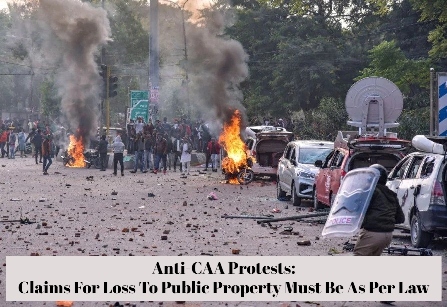

By Sunil Garodia
First publised on 2022-02-12 04:23:31
The Supreme Court has asked the UP government to recall the notices issued for recovery of money for loss caused to public property during the anti-CAA protests in the state as it said they were issued disregarding the Supreme Court guidelines. The court said that the UP government had acted as both complainant and adjudicator in the proceedings against the protestors.
The court was not impressed by the UP's additional advocate general Garima Prasad's argument that the state government had framed a new Act in compliance with the SC directive and it was not there when the notices were issued. She also submitted that the notices were in conformity with the Allahabad HC's direction. The Supreme Court said that the state government should not have gone by the high court direction if there was a Supreme Court directive in the same matter. It said it will examine how the Allahabad HC issued a contrary order.
The court categorically asked the UP government to issue fresh notices as per the new state law by dropping the earlier notices. It said that if this was not done, the court would be constrained to quash the earlier notices.
It is no one's case that violent protestors causing damage to public or even private property should be allowed to go scot free. But any penalty to be imposed on them must be as per law and due process must always be followed. The Supreme Court reminded the state government that adjudication in such cases has to be done by judicial officers and not by the state administration.
In a bid to quell the anti-CAA protests, the UP government had hurriedly issued notices to protestors 'identified' through CCTV footage to repay for loss to public property. But the decision flouted SC directives, ignored norms and was arbitrary. At least one notice was issued to a person who was already dead and a few who received the notices were in their nineties. The Supreme Court has done well to put a check on this. The UP government must proceed according to law.











